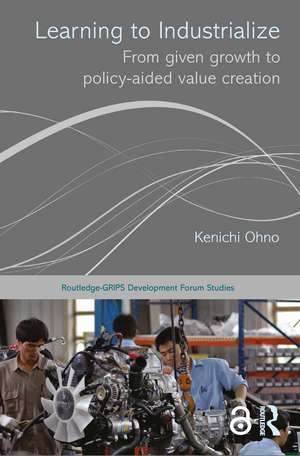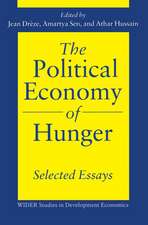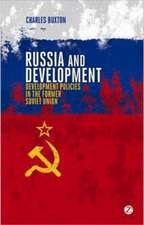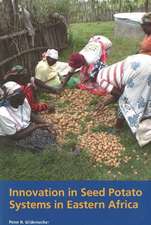Learning to Industrialize: From Given Growth to Policy-aided Value Creation: Routledge-GRIPS Development Forum Studies
Autor Kenichi Ohnoen Limba Engleză Paperback – 15 sep 2014
Natural resources and foreign aid and investment can take a country to a certain income level, but growth stalls when given advantages are exhausted. Economies will be caught in middle income traps if growth impetus is not internally generated. Meanwhile, countries that have soared to high income introduced mindset, policies, and institutions that encouraged, or even forced, accumulation of human capital – skills, technology, and knowledge. How this can be done systematically is the main topic of policy learning. However, government should not randomly adopt what Singapore or Taiwan did in the past. A continued march to prosperity is possible only when policy makers acquire capability to formulate policy suitable for local context after studying a number of international experiences.
Developing countries wanting to adopt effective industrial strategies but not knowing where to start will benefit greatly by the ideas and hands-on examples presented by the author. Students of development economics will find a new methodological perspective which can supplement the ongoing industrial policy debate. The book also gives an excellent account of national pride and pragmatism exhibited by officials in East Asia who produced remarkable economic growth, as well as serious effort by an African country to emulate this miracle.
The Open Access version of this book, available at http://www.taylorfrancis.com/doi/view/10.4324/9780203085530 has been made available under a Creative Commons Attribution-Non Commercial-No Derivatives 4.0 license.
| Toate formatele și edițiile | Preț | Express |
|---|---|---|
| Paperback (1) | 287.07 lei 43-57 zile | |
| Taylor & Francis – 15 sep 2014 | 287.07 lei 43-57 zile | |
| Hardback (1) | 736.21 lei 43-57 zile | |
| Taylor & Francis – 19 oct 2012 | 736.21 lei 43-57 zile |
Preț: 287.07 lei
Nou
Puncte Express: 431
Preț estimativ în valută:
54.95€ • 59.71$ • 46.19£
54.95€ • 59.71$ • 46.19£
Carte tipărită la comandă
Livrare economică 21 aprilie-05 mai
Preluare comenzi: 021 569.72.76
Specificații
ISBN-13: 9780415705820
ISBN-10: 0415705827
Pagini: 368
Dimensiuni: 156 x 234 mm
Greutate: 0.51 kg
Ediția:1
Editura: Taylor & Francis
Colecția Routledge
Seria Routledge-GRIPS Development Forum Studies
Locul publicării:Oxford, United Kingdom
ISBN-10: 0415705827
Pagini: 368
Dimensiuni: 156 x 234 mm
Greutate: 0.51 kg
Ediția:1
Editura: Taylor & Francis
Colecția Routledge
Seria Routledge-GRIPS Development Forum Studies
Locul publicării:Oxford, United Kingdom
Public țintă
Postgraduate and UndergraduateCuprins
Introduction Part 1: Ideas and Methods 1. The Developmental Trap 2. Industrial Policy in the Age of Globalization 3. Ingredients of Proactive Industrialization 4. Policy Procedure and Organization Part 2: Country Studies 5. Meiji Japan: From Feudalism to Industrialization 6. Singapore: National Productivity Movement 7. Taiwan: Policy Drive for Innovation 8. Malaysia: Trapped in Upper Middle Income 9. Vietnam: Growth without Quality 10. Ethiopia: The Growth and Transformation Plan
Recenzii
'Professor Ohno has written a pragmatic, clear-eyed argument in favor of 21st century industrial policy and provides examples and ways that developing countries can both comply with WTO rules and hasten the development of industrial sectors in which they can develop profitably. This is a valuable addition to the literature on industrial policy, as it moves beyond the old "state vs. market" arguments and focuses attention on the steps and capacities that need to be developed. Practitioners as well academics interested in industrial policy will find this book worth reading.' — David O. Dapice, Associate Professor of Economics, Tufts University, U.S.A.
Descriere
Not all developing countries are alike. Some rise rapidly to join the rank of advanced nations while others are stuck with poverty. This book argues that growth based on natural resources or geographical advantages will sooner or later hit the wall.





















